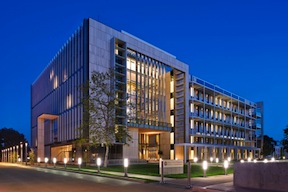Researchers at University of California, San Diego School of Medicine are now working with functional magnetic resonance imaging (fMRI) to predict language development in kids with autistic spectrum disorder (ASD).
Instances of autism have been rapidly increasing in the United States over the past few decades, with recent rates of affliction reported as high as 1 in 68 children. For many children affected by autism spectrum disorder (ASD), difficulties with language development are an unfortunate reality.
Using fMRI brain scans of 12-19 month old children that may have autism, the scientists report that they are able to predict whether a child will develop normal language skills, according to the new UCSD study.
The brain scans, which are performed while the young patients are asleep, are the first of their kind to be used for autism diagnosis and a departure from the behavior-based assessments currently in use.

By monitoring the brain’s responses to recorded language played in the fMRI while the child is sleeping, the researchers were able to get a clear picture of the brain’s activity in the associated language centers during the activity. The UCSD researchers then concluded that those children whose fMRI scans showed activity in their brain’s language centers eventually will develop better language skills — and vice versa.
According to Eric Courchesne, an autism researcher at UC San Diego and senior author of the study, fMRI scans may be helpful in developing appropriate therapies for those children affected by autism.
“We wanted to see if patterns of brain activity in response to language can explain and predict how well language skills would develop in a toddler with ASD before that toddler actually began talking,” said Courchesne.
“It’s important to develop more and new biological ways to identify and stratify the ASD population into clinical sub-types so that we can create better, more individualized treatments,” said co-author Karen Pierce, PhD, associate professor of neurosciences and co-director of the Autism Center of Excellence.
“Our work represents one of the first attempts using fMRI to define a neurofunctional biomarker of a subtype in very young ASD toddlers,” said Pierce. “Such subtypes help us understand the differences between persons with ASD. More importantly, they can help us determine how and why treatments are effective for some, but not all, on the autism spectrum.”
In addition to receiving over $7.8 million from the National Institute of Mental Health since 2009, Pierce and Courchesne’s research on autism was supported by grants from the National Foundation for Autism Research and Jesus College, Cambridge and the British Academy.
 As one of the nation’s leading medical research institutions, University of California, San Diego is a highly subsidized and active market for bioresearch.
As one of the nation’s leading medical research institutions, University of California, San Diego is a highly subsidized and active market for bioresearch.
Some Key funding stats from UCSD:
- UC San Diego received a total of $1.1 billion in research funding for all fields during the 2014 fiscal year.
- UC San Diego is to break ground on the $269 million Altman Clinical and Translational Research Institute.
- UC San Diego is the 3rd largest employer in the county (26,000 employees) and its faculty and alumni have created 193 new startup companies.
- The University of California, San Diego received $20 million in order to continue research focused on understanding the pathology of chronic lymphocytic leukemia.
Hundreds of active science researchers interested in the purchasing new biotechnology at premier lab supply events will be attending the 40th Semiannual Biotechnology Vendor Showcase™ Event at UC San Diego on August 20, 2015.
With over 600 annual attendees, this is one of Southern California, and the nation’s, most popular biotechnology events. For example, last year the Biotechnology Vendor Showcase™ Event at the UCSD attracted 644 attendees from 54 different research buildings and 61 on-campus departments. Of these attendees, 214 were purchasing agents, professors and post docs, and 83 were lab managers.
To learn more about exhibiting at UCSD, click below:
Laboratory equipment vendors interested in promoting lab products at top-funded research universities can exhibit at UCSD and other institutions with Biotechnology Calendar, Inc.’s line of premier biotechnology tradeshows.
Full schedule of 2015 Biotechnology Calendar, Inc. events:





